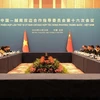Strengthening the connectivity and non-traditional security cooperation between ASEAN and China was the focus of two seminars held in Nha Trang city, the central province of Khanh hoa province, from July 5-6.
The seminars, which were attended by government officials and researchers from ten ASEAN member countries, China and the ASEAN Secretariat, were part of activities hosted by Vietnam as a coordinator for the ASEAN-China dialogue ties on the occasion of the 20 th anniversary of the two sides’ dialogue relationship.
Participants emphasised the significance and importance of the Master Plan on ASEAN Connectivity adopted by ASEAN leaders in October, 2010 for the connectivity and building of the ASEAN Community, saying that it created an important premise for expanding the connectivity between ASEAN and its partners, as well as economic linkages in East Asia .
They shared views that close geographic distances, fine historical relations among nations and enhanced economic and trade exchanges through the ASEAN-China Free Trade Area would be important foundations and primary advantages for further strengthening the connectivity between the two sides.
The delegates discussed orientations and measures for ASEAN and China to cooperate in successfully implementing the master plan on connectivity between the two sides, focusing on developing transport infrastructure, seaport systems, maritime transport, aviation, information technology and people-to-people exchange.
The increased connectivity would bring many positive results, contributing to deepening the strategic partnership and strengthening mutual understanding and trust between ASEAN and China , for regional peace, stability and prosperity, they said.
In addition to advantages and opportunities from the increased connectivity, participants also discussed related non-traditional security challenges and measures to further strengthen ASEAN-China cooperation such fields as prevention of transnational crime, human and drug trafficking, illegal migration, money laundering, and mitigation of climate change and natural disasters; energy security; food and water resources; and maritime security.
At the seminars, Chinese representatives affirmed the Chinese government’s policy of attaching importance to relations with ASEAN and continued support for ASEAN to successfully implement the Master Plan on ASEAN Connectivity.
China will join ASEAN in studying forms to attract private investment in developing hard and soft infrastructure and human resources, improving capacity and strengthening scientific and technological cooperation, they said./.
The seminars, which were attended by government officials and researchers from ten ASEAN member countries, China and the ASEAN Secretariat, were part of activities hosted by Vietnam as a coordinator for the ASEAN-China dialogue ties on the occasion of the 20 th anniversary of the two sides’ dialogue relationship.
Participants emphasised the significance and importance of the Master Plan on ASEAN Connectivity adopted by ASEAN leaders in October, 2010 for the connectivity and building of the ASEAN Community, saying that it created an important premise for expanding the connectivity between ASEAN and its partners, as well as economic linkages in East Asia .
They shared views that close geographic distances, fine historical relations among nations and enhanced economic and trade exchanges through the ASEAN-China Free Trade Area would be important foundations and primary advantages for further strengthening the connectivity between the two sides.
The delegates discussed orientations and measures for ASEAN and China to cooperate in successfully implementing the master plan on connectivity between the two sides, focusing on developing transport infrastructure, seaport systems, maritime transport, aviation, information technology and people-to-people exchange.
The increased connectivity would bring many positive results, contributing to deepening the strategic partnership and strengthening mutual understanding and trust between ASEAN and China , for regional peace, stability and prosperity, they said.
In addition to advantages and opportunities from the increased connectivity, participants also discussed related non-traditional security challenges and measures to further strengthen ASEAN-China cooperation such fields as prevention of transnational crime, human and drug trafficking, illegal migration, money laundering, and mitigation of climate change and natural disasters; energy security; food and water resources; and maritime security.
At the seminars, Chinese representatives affirmed the Chinese government’s policy of attaching importance to relations with ASEAN and continued support for ASEAN to successfully implement the Master Plan on ASEAN Connectivity.
China will join ASEAN in studying forms to attract private investment in developing hard and soft infrastructure and human resources, improving capacity and strengthening scientific and technological cooperation, they said./.



















